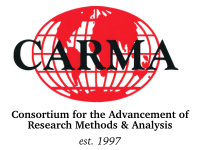New Doctoral Student Workshop Series
What is the New Doctoral Workshop Series?
CARMA’s New Doctoral Student Workshop Series is designed specifically for early-stage PhD students who want to build a strong foundation in research methods while connecting with a supportive community of peers and mentors. Through live, interactive sessions led by experienced scholars, you’ll gain essential insights into the research process, learn strategies for managing your dissertation, and explore tools to strengthen your academic success. Whether you’re looking to deepen your understanding of methodology or simply figure out where to begin, this series offers the guidance and encouragement you need—right when you need it most.
New Doctoral Student Workshop Series Schedule
Welcome to Academia
This session provides a realistic preview of what to expect as you join the academic profession—from your first seminar to your first conference—as well as how the dissertation and publication process typically unfold. We’ll also introduce you to critical methodological resources, such as CARMA, ORM, and RMNET, among others, that will support your growth. Think of this session as your academic orientation and motivational kickoff.
Panelists:
Andrew Hanna, University of Nebraska
Chris Winchester, Texas Tech University
Betty Zhou, Texas A&M University
Watch Recorded Session
Access the PhD GPS presented by Chris Winchester
Access Slides from Andrew Hanna
Access Slides from Betty Zhou
Ethics, Open Science, and Scientific Integrity
Navigating ethical dilemmas and transparency expectations is increasingly complex in today’s research landscape. This session will introduce key principles underlying open science, responsible authorship, and data integrity. We’ll highlight both emerging best practices and enduring values that support credible, replicable science. Whether you’re pre-registering a study or conducting a peer review, these concepts are foundational to a trustworthy research career.
Panelists:
George Banks, University of North Carolina Charlotte
Gilad Chen, University of Maryland
Andreas Schwab, Iowa State University
Watch Recorded Session
Access Slides from George Banks
Access Slides from Gilad Chen
Access Slides from Andreas Schwab
Connecting Theory to Methods
Theory isn’t just a starting point to conducting research—it’s the backbone of it. This session explores how theoretical frameworks shape sampling, measurement, analysis, and interpretation. We’ll emphasize the reciprocal relationship between theory and method, helping you understand how methodological decisions influence theory testing and development. Ideal for researchers in both micro and macro domains.
Panelists:
Ernest O’Boyle, Indiana University
Paul Spector, University of South Florida
Measurement: From Scales to Sources
Good measurement is the foundation of good science. This session offers an overview of key considerations in measurement, including scale development, psychometric validation, data source selection, and common challenges like common method variance. A dual focus will introduce both micro-oriented approaches (e.g., surveys, panels) and macro perspectives (e.g., proxies, archival indicators). You’ll leave better equipped to select, refine, and defend your measures.
Panelists:
Michael Braun, DePaul University
Don Kluemper, Texas Tech University
Mikko Rönkkö, University of Jväskylä
Watch Recorded Session
Access Slides from Michael Braun
Access Slides from Don Kluemper
Research Design and Causal Inference
This session dives into the logic and structure of causal claims in organizational research. It is always better to design around than analyze through, so with this mantra, we’ll cover core design types—including experiments, natural experiments, and quasi-experimental designs—as well as strategies for addressing endogeneity and confounds. If you’ve ever asked, “Can I really say this caused that?”—this session is for you.
Panelists:
Heiko Breitsohl, University of Klagenfurt
Nikos Dimotakis, Oklahoma State University
Deborah Powell, University of Guelph
Literature Reviews, Meta-Analyses, and the Accumulation of Knowledge
Understanding and contributing to cumulative science requires more than just citing prior work. This session covers the logic, design, and execution of literature reviews, systematic reviews, and meta-analyses. We’ll discuss how each approach helps synthesize knowledge, identify gaps, and offer new directions. Participants will gain clarity on when and how to undertake these methods to make meaningful contributions to the field.
Panelists:
Erik Gonzalez-Mulé, Indiana University
Goran Kuljanin, DePaul University
Scott Morris, Illinois Institute of Technology
Watch Recorded Session
Access Slides from Goran Kuljanin
Access Slides from Scott Morris
Qualitative Methods: Assumptions, Approaches, and Applications
This session introduces qualitative research not just as a method, but as a different way of knowing. We’ll discuss when qualitative approaches are appropriate, key design and epistemological considerations, and the distinction between informants and participants. Whether you’re conducting interviews, case studies, or ethnography, this session will help you appreciate the rigor and richness of qualitative inquiry.
Panelists:
Tine Köehler, University of Melbourne
Jane Lê, Otto Beisheim School of Management
Rhonda Reger, University of North Texas
AI and the Future of Organizational Research
Artificial Intelligence is transforming how we generate, analyze, and interpret data in the organizational sciences. This session offers a grounded overview of emerging AI tools and applications in research design, measurement, and writing. We’ll also critically examine the promises and pitfalls of AI in academic work. Whether you’re curious or skeptical, this session will prepare you to engage thoughtfully with this evolving frontier.
Panelists:
Justin DeSimone, University of Alabama
Mikko Rönkkö, University of Jväskylä
Jesper Wulff, Aarhus University





